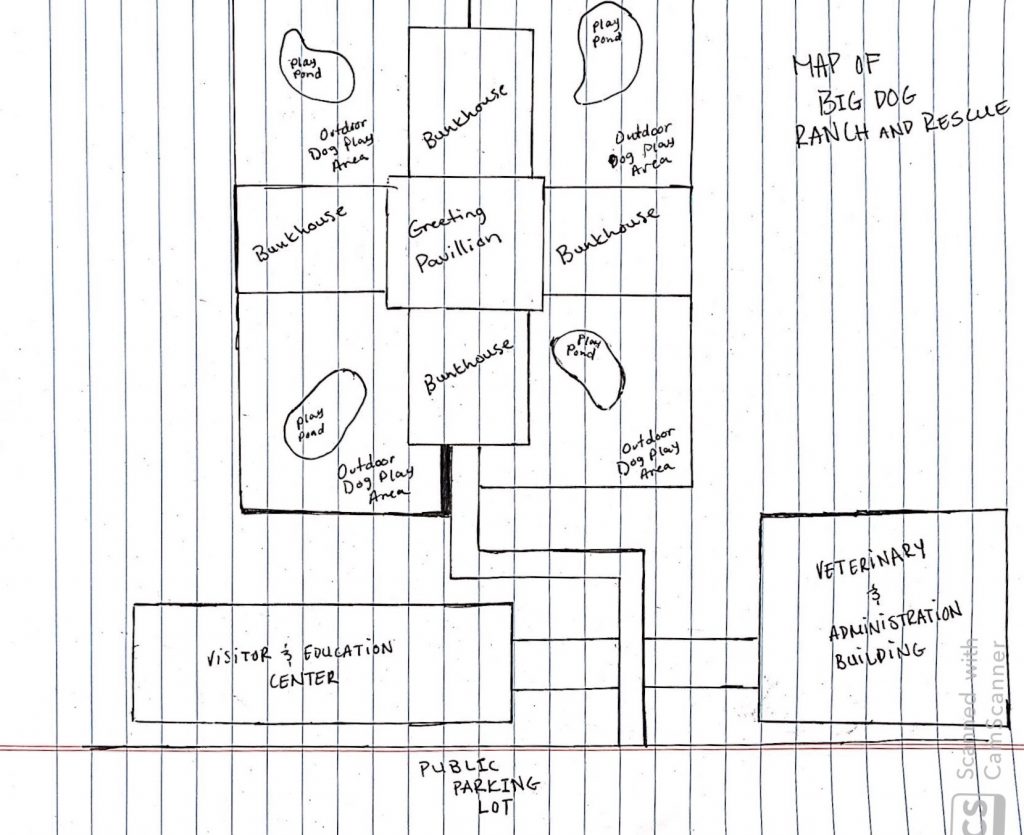Located just 10 miles west of West Palm Beach, there is a refuge for dogs of all breeds and sizes. Big Dog Ranch Rescue (BDRR) is the largest cage-free, no-kill shelter in the United States. The facility is home to 600 dogs at a time, and due to their successful adoption rates, pets are always leaving to make room for newcomers.
The facility is completely dedicated to the lives of its dogs. The rescue’s website states the mission is, “To save dogs of all breeds from certain death, provide a loving, transitional home while preparing dogs for their forever families.”
BDRR is not the typical rescue where a person can walk in and adopt the same day. Individuals must fill out an application and pass a background test that the rescue conducts on all possible adopters. “We ultimately want the dogs to find their forever homes,” said Christopher Kraus, CEO of BDRR. “Our application process is used to make sure that the dogs go to a person or family who understands their needs as a rescue dog and will provide them with a stable and quality life.”
Jenna Pullara and her fiancé, Graham Ramos, were lucky enough to meet the missing link of their family at the rescue. They met Enzo, the golden retriever mix, before any other dog, and although they adored his attitude and looks, they still wanted to check out all the options the rescue had to offer.

After meeting multiple dogs, they felt they had only really made a connection with Enzo, “We headed straight to the main office and began the adoption paperwork,” said Pullara. She and Ramos are glad that they trusted their gut feeling, “In the weeks since we brought him home, he has been the best, and I’m not just saying that, he is actually our dream dog,” said Pullara.
“We feel as though we won the lottery with Enzo, and that would not have been possible without Big Dog Ranch Rescue,” said Pullara.
For the last six years, the rescue has operated mostly off donations, with a minor amount of funding coming from what it makes from adoption fees and events. Likewise, the rescue is staffed with more than 100 volunteers who dedicate numerous hours a week to cleaning up after, walking, grooming and playing with the dogs.
Goals for the growth and success of the rescue have been broken into what staff and administration call ‘campus phase I’ and ‘campus phase II.’
Since the completion of ‘campus phase I’ in 2016, the center has moved its adoptable companions into four separate, temperature controlled, bunkhouses where dogs live together and get use to socialization, both with people and with other dogs. The bunkhouses home 2-5 dogs at any time and are all connected to outdoor areas with pools centered in the middle.
In regard to their plans for campus phase II, Kraus shared, “we have a very vibrant new program training dogs for veterans with PTSD and we have 41 dedicated volunteers for that program alone, to help train those dogs.” The center has partnered with the local VA in hopes of providing veterans with newly trained service dogs.
“These dogs will be adoptable to veterans that the VA has identified that would benefit from having a dog to assist with their PTSD,” said Kraus. “Veterans actually come out through their health and recreation department to the facility, and they get to interact with the dogs and volunteer with the dogs and train them while they’re here.”
Additionally, in time of crisis BDRR will often take dogs from other regions. The facility has rescued dogs from Puerto Rico, Georgia, Alabama, and most recently the Bahamas. “The biggest challenge is when we have a natural disaster,” said Kraus. “Like for Puerto Rico we helped place 2000 dogs over the year period. Today, we just took 132 dogs out of the Bahamas.”
Melissa Ferguson, social media director for the center, updated that they have rescued 151 dogs and counting, and they have even successfully reunited 57 of the dogs with their original owners.

“A lot of the dogs are heartworm positive, anemic and very weak after fighting their way through hurricane Dorian,” said Ferguson. “They went through a three-week quarantine before being ready for adoption.”
Though the dogs came in being shy and nervous while adapting to their new surroundings, they quickly warmed up, acclimating and socializing with the volunteers and other dogs. “Several of the Dorian dogs have been adopted so far,” said Ferguson. “We hope they all find homes since they are all very special and have their own unique personalities and characteristics!”
Adoption applications can be filled out in person at the rescue, or on their website, www.bdrr.org.
































